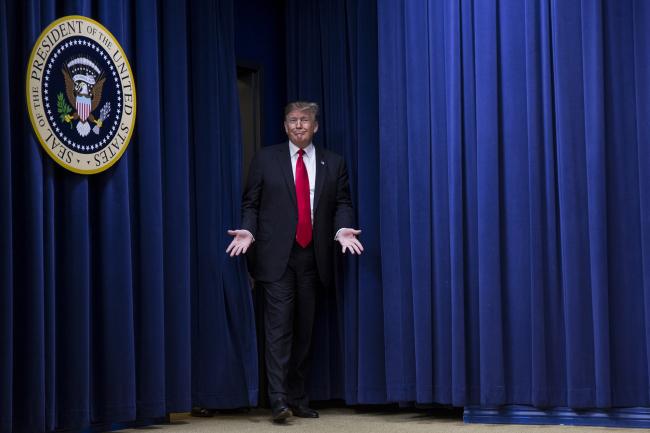(Bloomberg) -- Halfway through Donald Trump’s first term, it’s getting easier to piece together an account of how his policies are supposed to drive economic growth.
And the economy is, in fact, expanding pretty fast –- but not necessarily for the reasons Trump said it would. The president promised to squeeze more American growth out of businesses and foreigners. Instead it’s the government, deploying its balance sheet via deficit-spending, that’s doing the work.
The theoretical version of how Trumponomics would succeed might look something like this: After inheriting the most lopsided U.S. recovery of modern times, in which households contributed a record share, Trump would summon reinforcements from two directions.
First, he’d get tough with U.S. counterparties, friend or foe -- reducing the drag from trade, and maybe even turning it to a plus. Second, he’d revive the long-dormant enthusiasm for investing among American companies, by lowering their tax burden (as well as slapping tariffs on their foreign rivals.)
It hasn’t quite worked out that way.
Neither foreigners nor business investment have come to the rescue. Trade cut into the expansion by the most in more than 30 years last quarter. Corporate spending on plant and equipment unexpectedly fell in November, according to data published Friday, and it’s been essentially flat as a component of growth.
Trump’s policies could deliver gains in those areas over the longer run. The latest numbers on business investment were disappointing, but it’s early to judge the effects of Trump’s fiscal policy, said Stephen Moore, the co-author of the recent book “Trumponomics” and an adviser to Trump in 2016. “I totally reject this idea that the economy is on a sugar high,” he said. “The tax cuts are just kicking in.”
But right now, the motor is fiscal loosening.
Under Trump, spending has picked up sharply, while tax cuts eroded revenue. The result is budget shortfalls that are almost unprecedented during an upswing, like the one just announced for November -- and an American economy that’s growing in tandem with the deficit.
Remember Reagan?
If the Trump trajectory sounds familiar, it should. Ronald Reagan also talked about getting the government out of the way -- while running up large deficits, and spending more federal cash (as a share of the economy) than any U.S. president since the immediate aftermath of World War II.
Most economists say that Trump’s deficit-spending is unnecessary while the economy is doing well, and will store up problems by blowing up the U.S. national debt. That’s been a widespread view among politicians too. But there’s a growing number of dissidents.
The incoming Congress will feature a bloc of left-wing Democrats who have no real problem with the size of Trump’s deficits (though they’d distribute the proceeds very differently, backing universal healthcare or free college over military spending and tax cuts for the rich). They’re spoiling for a fight with the party’s more fiscally conservative leadership -– and they might even win it. America’s new left, like Trump, has little appetite for belt-tightening.
‘King of Debt’
Also gaining traction is a school of economics, known as Modern Monetary Theory, which argues that governments borrowing in their own currencies can’t go bust.
The U.S. can always create dollars to pay its dollar creditors, they say, so the only risk of too much government debt is inflation. It’s more dangerous when households and companies go on a borrowing spree -- as they did in the years before private debt crashed the economy in 2008.
In the decade since then, American’s public debt has ballooned -- without much immediate or obvious damage. There’s little sign right now of a surge in prices, or red flags in Treasury markets.
Trump says he presides over the best economy ever. He doesn’t dwell much on its underpinnings in fiscal deficits, devoting more time to explaining how he’ll boost trade and business. Still, the president who once called himself the “king of debt’’ is probably aware that borrowing costs for his government, by historical standards, remain cheap.
